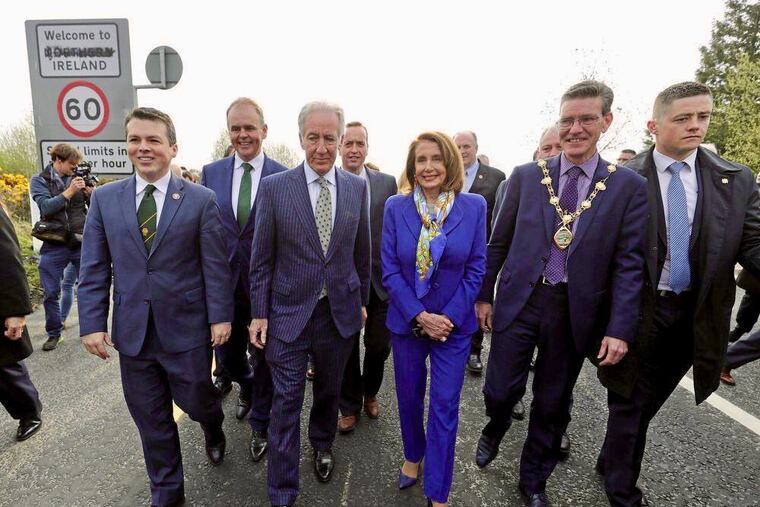Brexit must honor Good Friday agreement | Opinion
Prior to the 1998 Good Friday Agreement, Northern Ireland suffered from decades of violence between the British Army and both Irish Republican and British Loyalist paramilitaries.

Recently, I took part in an important congressional delegation led by Speaker of the House Nancy Pelosi to both the United Kingdom and Ireland. We traveled to both countries to deliver a clear and unambiguous message: It is vital that whatever Brexit deal ultimately passes the UK Parliament does not harm the Good Friday Agreement.
Prior to the 1998 Good Friday Agreement, Northern Ireland suffered from decades of violence between the British Army and both Irish Republican and British Loyalist paramilitaries. During “The Troubles,” the 300-mile border between the Republic of Ireland, which fought and won its independence from British rule a century ago, and Northern Ireland, the small northeastern part of the island still under British rule, was littered with armed soldiers, barbed wire, tanks, and watch towers. The Good Friday Agreement made it all disappear. It literally broke down barriers on the border and among its communities. Today, the border is so invisible one can cross it and not even realize it. The ability of people to freely travel and work across the island has allowed border communities to thrive. Elimination of the hard border was critical to the peace deal’s success.
The Good Friday Agreement would not have happened without U.S. leadership. While at first the British government resisted U.S. involvement in what they considered an “internal” matter, ultimately a more enlightened position emerged once Tony Blair became UK prime minister. As a close ally of both Britain and Ireland, the United States was the natural honest broker. President Clinton appointed Sen. George Mitchell as the U.S. special envoy to Northern Ireland and he chaired the peace talks that culminated in the Good Friday Agreement. Its success has been a rare, shining example to all seemingly intractable disputes around the world.
So what does this have to do with Brexit? Well, what made elimination of the border possible is that both Britain and Ireland are part of the European Union. Therefore, while two separate nations, they both have the same rules regarding immigration and customs. But with Britain now scheduled to exit the European Union, there is a serious risk of a return to a hard border on the island of Ireland, and with it a return to violence.
Some of the most enthusiastic Brexit proponents in the U.K. are pushing versions of Brexit that would ensure a return to a hard border in Ireland. It is clear that the Good Friday Agreement is just not a high priority for them. Indeed, former U.K. Foreign Secretary Boris Johnson, a prominent Brexit cheerleader, admitted as much. He said the border issue was insignificant, calling it “a gnat.” This rhetoric is both wrong and dangerous.
Just as it was in the 1990s, U.S. leadership is again needed to ensure the hard-won peace is preserved.
In a historic moment in Dublin, Speaker Pelosi stated in an address to the Irish Dail (Parliament), “We must ensure that nothing happens in the Brexit discussions that imperils the Good Friday Accord, including, but not limited to, the seamless border between the Irish Republic and Northern Ireland.” In other words, the Good Friday Agreement cannot become collateral damage from the United Kingdom’s decision to pull out of the European Union.
Brexit proponents have been touting the possibility of a post-Brexit free trade deal with the U.S. In every meeting our delegation took, from 10 Downing Street to Stormont, we made crystal clear there can be no U.S.-U.K. trade deal if any harm is done to the Good Friday Agreement. As Speaker Pelosi said in London, “If there were any weakening of the Good Friday accords, there would be no chance whatsoever for a U.S.-U.K. trade agreement … Don’t even think about it.” Each member of the congressional delegation is a member of the House Ways & Means Committee, which has jurisdiction over all trade agreements. We agree completely with the Speaker’s position.
Fortunately, it is possible for the U.K. to pass a Brexit agreement that preserves the Good Friday Agreement. The Withdrawal Agreement (WA) negotiated between Prime Minister Theresa May and the European Union ensures there would not be a return to a hard border in Ireland. We urge our friends in the British Parliament to pass this or any other Brexit proposal that preserves an open border.
The United States is, by law, a guarantor of the Good Friday Agreement. We will not stand by idly and watch it weakened or destroyed.
Brendan Boyle is a Democratic member of the U.S. House of Representatives, representing Pennsylvania’s 2nd congressional district.